Paradise Blue
Dominique Morisseau
Aurora Theatre Company
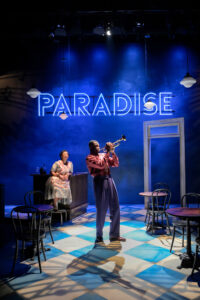
In Aurora Theatre Company’s award-winning Detroit ’67 in 2018, the sounds of Detroit’s homegrown, Motown music were the background beat of Dominique Morisseau’s funny and frightening, heart-warming and heart-stopping play, Detroit ’67, the first of a trilogy about her hometown and a story that explodes amidst horrendous riots that scarred the city for decades. The Company now opens Dominique Morisseau’s second part of the Detroit trilogy, this time set in 1949 in the predominantly Black neighborhoods of Blackbottom and Paradise Valley where the notes of jazz mesmerizingly fill the air and where a newly elected mayor has his sights on total neighborhood destruction in the name of urban renewal and a new freeway system.
Once again, the same, above adjectives of funny and frightening, heart-warming and heart-stopping can equally apply to Aurora’s emotionally captivating, gripping, and stunning production. In Paradise Blue, the play’s principles struggle internally and among themselves whether to flee the almost-certain demise or to stay and fight for the survival of the neighborhood they each cherish. And once again, Dominique Morisseau, Director Dawn Monique Williams and the stellar cast and crew of Aurora Theatre Company have scored a must-see production.
In the heart of Paradise Valley – home in the 1920s through the 1950s to some of the world’s best jazz clubs where the likes of the Duke or Billie played – is the oldest and still largest of those meccas, Paradise Club. Owned by locally famed trumpeter, Blue, Paradise Club is operated as a jazz club, café, and rooming house with the faithful help of his girlfriend, Pumpkin. Blue’s jazz quartet includes pianist Corn and drummer P-Sam; but his bass player, Joe, has left in a dispute about pay to play for a competitor club.
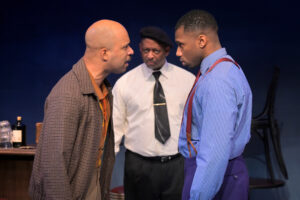
As the play opens, there is tension, suspicion, and a collision of wills developing between P-Sam and Blue with P-Sam pushing Blue to give into the missing member’s wishes and with Blue stubbornly refusing. He also implies more than just a change in their band’s make-up is coming: “Some folks downtown been comin’ ‘round here to discuss some business.”
Slow-and-smooth-talking Corn seeks to calm the tempers of both as to defend the folks of Blackbottom who are just trying to hang on and earn a living. Pumpkin too longs for the status quo of her neighborhood as well as her relationship with Blue to stay the same, but her constant, sunny smiles nervously also show a premonition that the changes she least want may be coming.
Just as Blue finally convinces a skeptical P-Sam to go find a new bassist so that the new Blue’s Black Bottom Quartet can be ready for a Friday night debut, in walks – no, in struts with mighty hip swishes and a look of cocky confidence – a woman dressed to be noticed, especially by any male present. Introducing herself as Silver, this new arrival from Louisiana looking for a long-stay room brings an air of exotic mystery and of some definite, but as-of-yet, unstated purpose. And with her entrance, there is no doubt that change is definitely coming.
Blue’s unrelenting focus on Friday night becomes an obsession as he struggles practicing his trumpet night after night, visibly in a fight with the instrument whose notes are not as pure as they once were. Demons of the past haunt Blue; and he wants out of Detroit and out of the club his father founded. He has a plan that includes a Friday night visit by club owners from Chicago to hear him on trumpet along with the jazz singing of Pumpkin. That Pumpkin cannot really sing is something he expects Corn to remedy in the next few days.
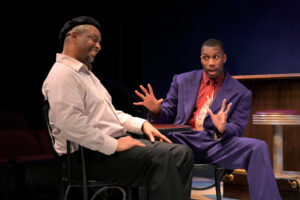
Titus VanHook’s handsome Blue is often morose in demeanor with eyes that wander downward in vacant searches for something that seems to be lurking in the shadows. There is a quiet sense of doom and danger that combines with a temper that can emerge in a moment’s notice when he perceives opposition to his secret, internal plans – be it from a stranger like Silver, from one of his long-time band members and friends, or even from his most-devoted Pumpkin. One can feel the danger Blue is potentially to himself and maybe to others; but his friend Corn loyally believes, “He ain’t a bad man, he just wanna be mighty but the world keep him small ..,. cost of bein’ colored and gifted.” Like Corn, we cannot help but sympathize with the pain Blue is evidently experiencing as he seeks to rediscover on his trumpet what Corn calls “love supreme,” “the perfect note that cleans your sins … that speaks directly to God.”
Michael J. Asberry’s Corn is a gentle giant who is both a peacekeeper and an encourager for others and who forgives the faults (or rumored faults) of others with grace. He speaks in mellow, deep tones that are soothing as well as enticing. His Corn can come out with a turn of phrase both funny and charming (“You lookin’ like a Sunday on a Tuesday”). He is also a lover at heart, something that the spark in his eyes and the near blush on his cheeks give away each time Silver walks by with her swinging hips and her purposefully prowling looks of tease and flirt.
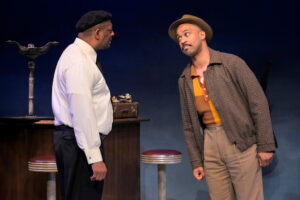
In contrast, P-Sam is always in the search for something better, be it more money (“When a Negro ain’t got no money, it’s like he smell different”) or the love of the one he calls “a go-along gal.” P-Sam is sure he can make life for Pumpkin much easier than hers is as Blue’s girl. Along with her, he does not want is to lose in his life the Paradise Club or its neighborhood. “Ain’t no place for a Black man outside of Blackbottom,” he asserts. To him, when playing in a white club, “they think of me no better than spilt whiskey on their shoe.” Kenny Scott is yet one more perfectly cast member in this outstanding cast who brings his dimples, cocked head, and an easy-going manner that can quickly give way to edgy impatience to create a P-Sam who has his own scheme and plan to ensure the Paradise Club lives on.
As strong and important as these three men are to the play and the story, in Dominque Morisseau’s play pivots in plot and energy around its two women – two who are in many ways as different as night and day and yet two who find a strong bond in their shared womanhood.
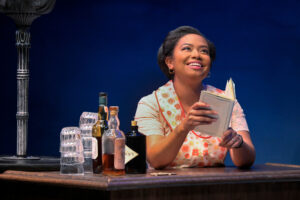
Pumpkin is at first blush, a simple, smiling, sweet woman who seems totally content in her life as a waitress, housekeeper, and cook at Paradise Club. She loves the Blackbottom neighborhood and finds purpose in helping provide for those less fortunate than she. She is totally devoted to the oft-sullen Blue, who is not always quick to return her constant looks and words of love. But Anna Marie Sharpe’s Pumpkin is much more than her surface self. She is, as Silver later comes to describe her, “a thinkin’ woman with her own words,” a lover of poetry who dares to step out of her day-to-day life in an apron to recite before the likes of Corn and P-Sam the poems of famed Harlem Renaissance poet, Georgia Douglas Johnson. A poem’s “The heart of a woman goes forth with the dawn” becomes increasingly her personal anthem and a call to shape her own destiny in ways that neither she nor anyone else could ever have predicted.
Anyone except perhaps Silver, who is the one person that sees Pumpkin woman-to-woman and that comes to recognize there is a force within that even Pumpkin has no idea that she can call upon.
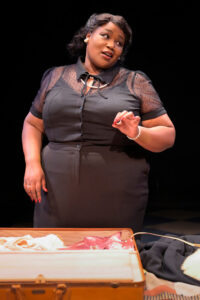
Rolanda D. Bell commands the stage whenever her Silver enters in everything from revealing lingerie to dresses so skintight that one is sure there will be a revealing split up the middle any minute. She can speak lines worthy in tone and nature to the great Mae West (“Can’t stand the heat in the kitchen; I prefer the heat in the bedroom”), has no trouble “speaking like a gangster” (“So everybody know [I] ain’t to be messed with”), and makes it clear to Pumpkin that when it comes to men, “Doll, ain’t none of us really safe.” She brings a reputation of being a “sexy spider,” “a voodoo woman from Louisiana,” who has “slept with fifty men in different cities and they all disappeared.” But Rolanda D. Bell’s Silver is – like Pumpkin – much different from her outward, presenting self – a thinking woman whose heart is much bigger than her brassy exterior and whose caring influence on Pumpkin leads to a surprising and climatic transformation in the name of self-preservation and self-determination.
With such a cast, the directorial task of Dawn Monique Williams maybe could have been to just get out of their way; but it is clear from the haunting, opening scene to the shocking, final moment that there are countless touches this director orchestrates that are full of artistic brilliance to keep the feeling of jazzy improvisation permeating throughout. Nothing ever seems scripted. There is a genuine sense that we are seeing these conversations, these reactions, and these moments of electric tension for the very first time. Throughout, the director is clearly paying attention to the whole of the scene while also diving it to shape the shrug of a shoulder, the turn of a head, or the smirk of a smile to ensure the script’s dialogue is honed to deliver its maximum potential. The result is a living, breathing ensemble that creates its own music that is even more impactful than any of its individual, masterful players.
The oft-eye-popping costumes of Maggie Morgan bringing the Detroit’s Blackbottom 1940s back to full life, the simple but effective scenic design of Stephen C. Jones, the trumpet playing of Geechi Taylor that projects so beautifully via the sound design of Cliff Caruthers, and the combination of subdued and exacting lighting of Stephanie Anne Johnson all capstone a production that is in every manner and moment truly an evening long to be remembered. Aurora Theatre continues its special relationship with the brilliant Dominque Morisseau, with a Paradise Blue that joins 1918’s Detroit ’67 as incredibly important stories of homage and respect about a part of Black and American history that must not be forgotten.
Rating: 5 E, MUST-SEE
A Theatre Eddy’s Best Bet Production
Paradise Blue continues through in live production through February 26, 2023 and in streaming February 21-26, 2023 at Aurora Theatre Company, 2018 Addison Street, Berkeley. Tickets for both the live and streamed performances are available online at https://www.auroratheatre.org/ . Please note: Masks are required to be worn at all times inside the theatre.
Photo Credits: Kevin Berne
